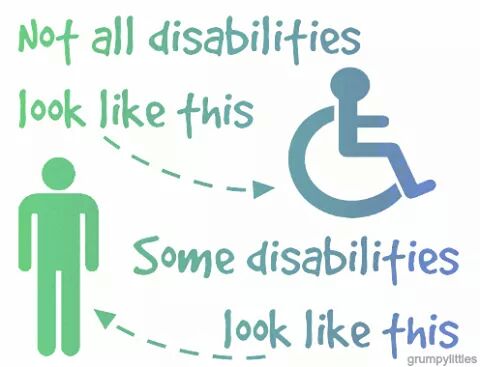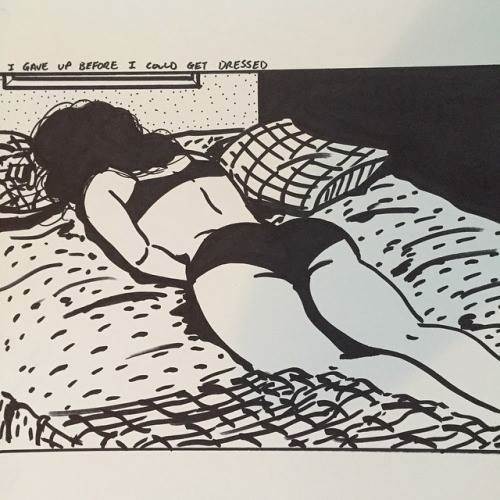How do you picture a person with a disability? Would you imagine a young, able-bodied and seemingly ‘normal’ woman? My guess is not.

From an outside perspective the notion that I am disabled is ludicrous; I can run, study, and hold down a demanding job. I am not physically impaired and, to date, I have been fairly successful in my academic ventures. Nonetheless, I battle a crippling disability on a daily basis – anorexia nervosa and chronic depression.
“But you seem so happy, you have friends, you’re sociable. I’ve seen you eat, you look healthy, you don’t look anorexic.” Are all responses I’ve received when discussing my struggles. The reality is that despite the fact I am weight restored and working very hard at recovery, I am still chronically unwell. As such I require extra time to complete projects, to rest and care for my health. Likewise, I have had to learn to complete my work within somewhat reduced hours due to the number of appointments that I need to attend and the number of days where I simply cannot function.
It’s taken me many years to figure out how to manage my disability in a way that allows me to sustainably live and enjoy life. My time at Imperial has been instrumental to learning how to do this. At school, and in my earlier years at Imperial, I took a largely ‘all-or-nothing’ approach, which lead to me burning out and eventually experiencing a serious relapse for which I was hospitalised.
For a long time I often felt guilty for the extra help and support I had to get through my degree, I felt like a fraud who wasn’t good enough to study at Imperial. I couldn’t see that my disability and associated side effects were valid reasons for needing a bit extra than everybody else. When I received my degree results my initial reaction was overwhelming relief and happiness but shortly after I began to feel that I had not achieved that grade on my own merit. It was only after a few months of working as DPW I realised that I am, in fact, living with a disability and that there is no shame in needing reasonable adjustments to manage that.


I have been incredibly lucky to work for an organisation that is so supporting of my needs, enabling me to figure out what works for me in terms of balancing my health alongside my professional development. It has been challenging and frustrating to realise that I may never be able to live and work in a totally normal way, nonetheless, I have learned that disability and illness does not have to get in the way of success. This year I have grown both personally and professionally, which in itself is a form of success, alongside delivering on the things I wanted to achieve by laying the foundations for whole-scale institutional change.
Without accepting the limitations imposed on me by my health, there is no way I would have survived my year as DPW, let alone been able to engender change. But that is not to say that acceptance has been easy: every day is a challenge and getting through it is like climbing a mountain. Living with chronic mental illness is exhausting in a way that cannot be explained to those who do not understand; the tiredness is perpetual and fails to be remedied by sleep. Add on top a mix of medications and you begin to muddle through life in a semi-zombie-like state. There is an analogy that the online community of disabled and chronically ill people use known as Spoonie Theory. In short, it conceptualises what it is like to live with disability by using spoons as a currency: every day you have an allotted number of spoons that you can use, if you do not use them you can save them for the next day and if you use them all you have to borrow from the following day. Spoons are used to purchase activities ranging from simple daily tasks such as brushing your teeth to completing a major task such as running a marathon or a piece of coursework - the more demanding and time consuming the task the more spoons you require. If you do not manage your spoons properly you can end up without spoons to get through the day, week or month - similarly to managing your student loan or pay check - meaning that it is imperative to recognise your limitations and manage your activities accordingly.


Sometimes I wake up so incredibly anxious as if the world is going to imminently implode, other days I wake up so sad, hopeless or apathetic that my body feels like a ten tonne weight that cannot be moved, and on good days I am able to get up after only two hits of the snooze button. Some days I cannot make it into work, hell I cannot even brush my teeth, other days I have to leave work early because I am exhausted or overwhelmed, and a lot of days I can stare at my screen all day unable to clear the fog from my mind. I worry that people will see me as lazy or taking liberties when I come into the office late or take days off, even when they assure me that it is okay. I feel compelled to work twice as hard to prove that I am not a slacker, that I don’t come in late because I fancy a lie in, and that even though my disability is not visible, it is real. I feel perpetually judged by those around me even though I know that it is not the case and, in reality, is a projection of my self-judgement. I feel guilty for allowing myself to spend time doing fun things as I could be using that time to make up for lost work hours.
The truth is that these are expectations and worries I place upon myself however, many people living with disabilities, both external to and within the Imperial Community, face unfair judgement and expectations from peers, managers, lectures, tutors and other people around them who should form part of their support networks. In order to change this, it is important for those of us who have experienced brilliant support to share that with others to inspire both disclosure and good practise. Likewise, when we experience prejudice, neglect or unfair treatment it is vital for us to speak out against it in order to create change. Nevertheless this is a difficult thing to do as it places us in a very vulnerable position and it is therefore necessary for institutions and employers etc. to take affirmative action in order to create a safe place and appropriate structures for disabled persons to speak up, engender change and seek the support that they need.
Welfare Love, EJ xoxo
A day in sabb-life with disability
*This video may be triggering*


